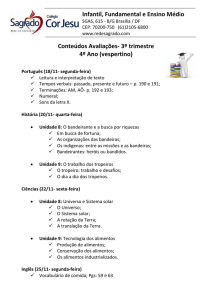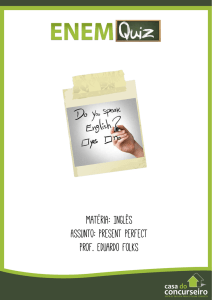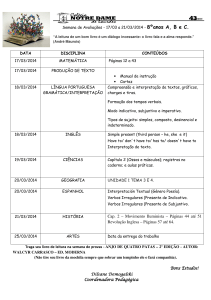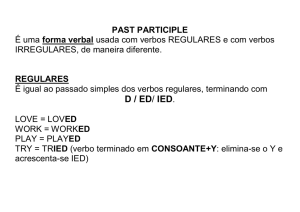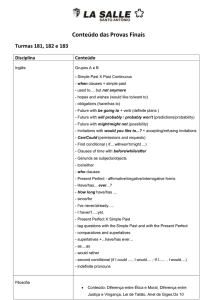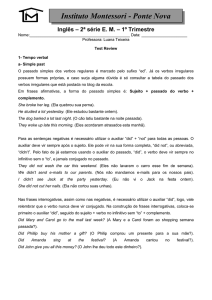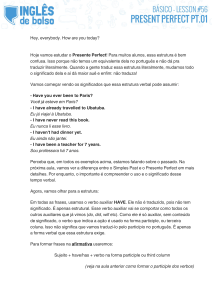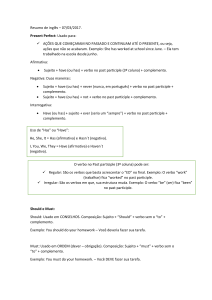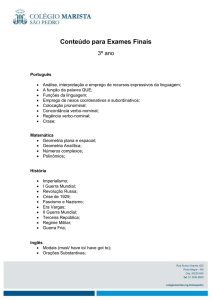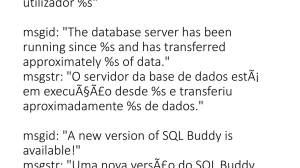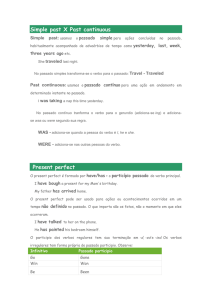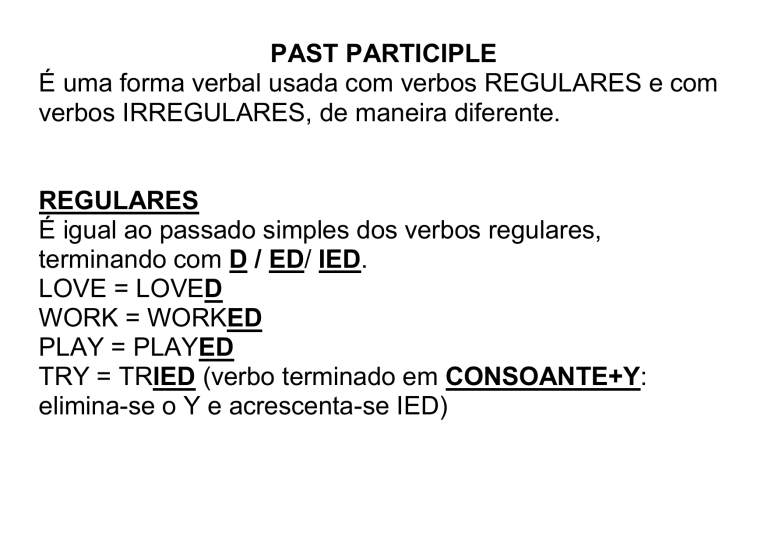
PAST PARTICIPLE
É uma forma verbal usada com verbos REGULARES e com
verbos IRREGULARES, de maneira diferente.
REGULARES
É igual ao passado simples dos verbos regulares,
terminando com D / ED/ IED.
LOVE = LOVED
WORK = WORKED
PLAY = PLAYED
TRY = TRIED (verbo terminado em CONSOANTE+Y:
elimina-se o Y e acrescenta-se IED)
IRREGULARES
Para sabê-los é preciso consultar a TERCEIRA COLUNA a
lista de verbos.
INFINITIVE
PAST
PAST
TRANSLATION
PARTICIPLE
To be
Was/were
Been
Ser/estar
To buy
Bought
Bought
Comprar
To make
Made
Made
Fazer
PRESENT PERFECT
NEWS: notícias recentes (radio/TV/internet etc.)
The Pope has resigned.
RESULT NOW: ação que começou no passado e produziu um
resultado agora.
The weather has changed dramatically.
EXPERIÊNCIA DE VIDA: situações pelas quais alguém passou desde
que nasceu até o momento em que se está falando.
Have you ever eaten sushi?
I have never eaten sushi.
AFIRMATIVA:
I/You/We/They + Have + past participle
I have worked all day.
He/She/It…+ Has + past paticiple
She has taken vitamins.
INTERROGATIVA:
Have + I/You/We/They + past participle + ?
Have you worked all day?
Has+ he/she/it…+past participle + ?
Has she taken vitamins?
NEGATIVA
I/You/We/They + Have not / Haven’t + past participle
I have not worked all day.
He/She/It…+ Has not/ Hasn’t + past paticiple
She has not taken vitamins.
PRESENT PERFECT
Verb TO WORK
Affirmative
I have worked
You have worked
He has worked
She has worked
It has worked
We have worked
You have worked
They have worked
Negative
I have not worked
You have not worked
He has not worked
She has not worked
It has not worked
We have not worked
You have not worked
They have not worked
Interrogative
Have I worked?
Have you worked?
Has he worked?
Has she worked?
Has it worked?
Have we worked?
Have you worked?
Have they worked?
Verb TO TRAVEL
Affirmative
I have travelled
You have travelled
He has travelled
She has travelled
It has travelled
We have travelled
You have travelled
They have travelled
Negative
I have not travelled
You have not travelled
He has not travelled
She has not travelled
It has not travelled
We have not travelled
You have not travelled
They have not travelled
Interrogative
Have I travelled?
Have you travelled?
Has he travelled?
Has she travelled?
Has it travelled?
Have we travelled?
Have you travelled?
Have they travelled?
Verb TO CRY
Affirmative
Negative
Interrogative
I have cried
You have cried
He has cried
She has cried
It has cried
We have cried
You have cried
They have cried
I have not cried
You have not cried
He has not cried
She has not cried cried
It has not cried
We have not cried
You have not cried
They have not cried
Have I cried?
Have you cried?
Has he cried?
Has she cried?
Has it cried?
Have we cried?
Have you cried?
Have they cried?
Expressões que indicam tempo:
EVER / NEVER – são usados para falar sobre experiência de vida.
a) EVER (já) – é usado em frases interrogativas.
Has she ever travelled to Morocco?
Have you ever read “Harry Potter”?
b) NEVER (nunca) – é usado em frases negativas, mas sem usar not, porque
o never já indica negação (never = not + ever).
She has never travelled to Morocco.
You have never read “Harry Potter”.
JUST (já) – é usado para dizer que algo acabou de acontecer. É sempre
usado entre o HAVE/HAS e o PAST PARTICIPLE:
They have just married.
(HAVE/HAS + just + PAST PARTICIPLE)
ALREADY (já) – é usado para dizer que algo aconteceu antes do previsto
ou esperado. Pode ser usado entre o HAVE/HAS e o PAST PARTICIPLE
ou no final de frase afirmativa.
I’ve already finished my homework.
(HAVE/HAS + already + PAST PARTICIPLE)
He’s finished my homework already.
(HAVE/HAS + PAST PARTICIPLE + already)
YET (já) – é usado apenas no FINAL DE FRASES interrogativas ou
negativas:
I haven’t started my homework yet.
Have you started your homework yet?

